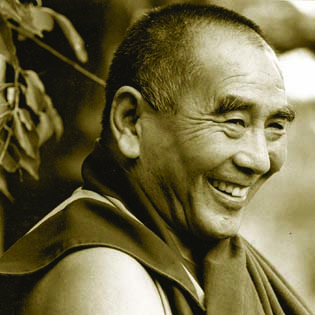Lhundub Sopa

Find all materials:
Born in 1923 to a farming family in the Shang principality of the west-central Tibetan region of Tsang, he entered a local Gelukpa monastery, Ganden Chökhor, at the age of eight. When he was eighteen, he moved to Lhasa to join the Je College of the great monastic university of Sera. Studying with some of Tibet’s greatest masters, he rose rapidly through the scholarly ranks, and was appointed tutor to an important young tulku, Khamlung Rinpoche. In 1959, shortly before the Lhasa uprising, when H.H. the Fourteenth Dalai Lama stood for his Geshe examination, Lhundub Sopa was chosen to serve as a debate partner, quizzing His Holiness on the Perfection of Wisdom literature. With the Chinese suppression of the uprising, Lhundub Sopa, like the Dalai Lama and tens of thousands of other Tibetans, made the perilous journey to India and exile. He completed his own scholarly studies in Buxaduar, West Bengal in 1962, attaining the very highest rank: Number One Lharampa Geshe.
In the same year, the Dalai Lama requested him to accompany three young tulkus to the United States so they could study English. They settled at a small Gelukpa monastery in Freewood Acres, New Jersey, overseen by the pioneer of Tibetan Buddhism in the United States, Ngawang Wangyal. There, Lhundub Sopa began to learn English and to attract the attention of American students, among them Robert Thurman and Jeffrey Hopkins. In 1967, he was invited by Richard Robinson, founder of the University of Wisconsin’s Buddhist Studies program, to move to Madison. At first, he was a teaching assistant for Prof. Robinson’s literary Tibetan course (a colleague of his, with only mild exaggeration, likened this to having the Pope helping out with a Latin class), but over the course of time he began to teach courses on his specialty, Indian and Tibetan Buddhist philosophy, and to draw increasing numbers of students. He eventually—not without difficulty, given the uniqueness of his training—won a regular faculty position, gained tenure, and was promoted eventually to full professor, his rank when he retired in 1997. Among those fortunate enough to complete Ph.D.s under Lhundub Sopa over the years were Jeffrey Hopkins, James Robinson, Roger Jackson, Ter Ellingson, Leonard Zwilling, Michael Sweet, Ed Bastian, Jose Cabezon, A.W. Barber, John Makransky, John Eppling, John Newman, Beth Newman, David Patt, James Blumenthal, James Apple, and Paul Donnelley.
Lhundub Sopa also was an important figure in the introduction of Tibetan Buddhism to the United States. Paralleling his career at the University of Wisconsin was his development of what now is known as Deer Park Buddhist Center, a fully functioning, traditionally-oriented Tibetan-style monastery in Oregon, Wisconsin, that has served both Tibetans and Westerners in important and diverse ways over many years. For decades, Lhundub Sopa himself taught regular Sunday classes on foundational texts and special summer sessions on difficult Buddhist philosophical topics, and at one time or another the monastery has hosted teachings and/or initiations by nearly every luminary of the Geluk tradition. Most notably, the Fourteenth Dalai Lama has visited Deer Park on multiple occasions, including in 1981, when he bestowed there the first Kālacakra initiation ever offered in the West, and 2007, when he consecrated the spectacular new temple at Deer Park that he envisioned, then saw tirelessly to completion in his later years. Lhundub Sopa also traveled often to teach, making frequent visits to various parts of the U.S., as well Mexico, Taiwan, Europe, and other locales.
On August 28, 2014, at the age of 91 (92 by Tibetan reckoning), Lhundub Sopa passed away in Wisconsin. Geshe-la was one the last surviving masters to receive most of their scholarly training in Tibet, and one of the first such scholars to teach in a Western university. He was Professor Emeritus of South Asian Studies at the University of Wisconsin-Madison, author of numerous scholarly works on Tibetan Buddhism, founding and emeritus abbot of Deer Park Buddhist Center in Oregon, Wisconsin, and a revered Buddhist teacher, with students in every part of the world.